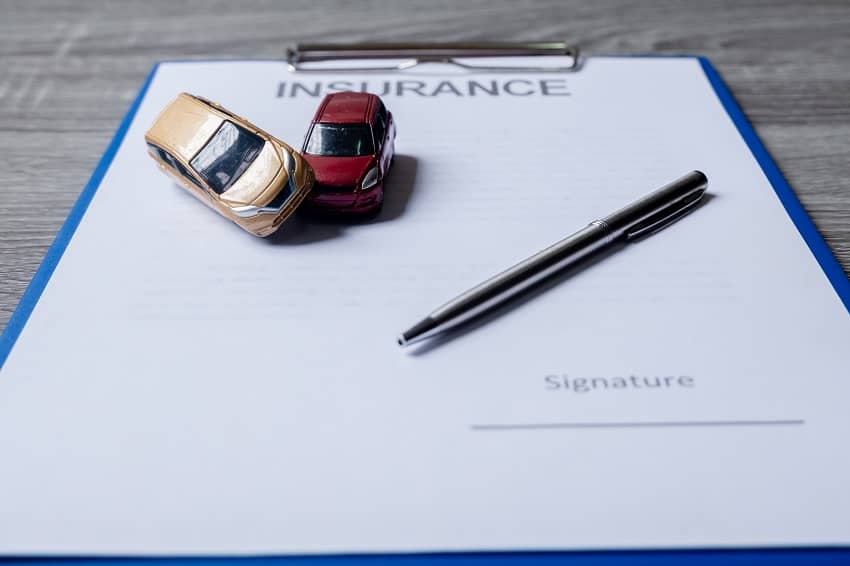Collision car insurance covers the cost of damages to your vehicle that result from a collision with another car or object. Car accidents can be an unexpected and costly event.
Even the most careful drivers may find themselves in an accident at some point. Collision car insurance is designed to provide coverage for damages to your vehicle that result from a collision with another vehicle or object. This type of insurance can help alleviate the financial burden that often comes with an accident, covering the cost of repairs or replacing your vehicle if it is deemed a total loss.
In this article, we will review collision car insurance in detail and provide information on how it works, what it covers, and how to get the coverage you need.
Table of Contents
What Is Collision Car Insurance?
Collision Car Insurance: Protect Your Ride With The Right Coverage
Car insurance is essential for protecting yourself and your assets in case of an accident. One type of coverage that you may want to consider is collision car insurance. In this section, we’ll define what collision car insurance is, how it differs from other car insurances, and highlight its benefits.
Definition Of Collision Car Insurance
Collision car insurance is a type of coverage that pays for damages caused by colliding with another object, such as another vehicle or stationary object. This coverage is optional and goes beyond the minimum requirements mandated by law. It is designed to protect the value of your car in case of an accident.
How Does It Differ From Other Car Insurances?
There are various types of car insurance available in the market. The key differences between collision car insurance and other car insurances are:
- Liability insurance: Covers damages caused to another person and their vehicle or property in case of an accident that you are found at fault. It does not cover damages to your car or yourself.
- Comprehensive insurance: Covers damages caused to your car that are not due to accidents, such as theft, natural disasters, or vandalism. Collision car insurance only covers damages caused by collisions.
- Personal injury protection (pip) insurance: Covers medical expenses and lost wages for you and your passengers, regardless of who is at fault. It does not cover damages to your car.
Benefits Of Collision Car Insurance
Collision car insurance provides several benefits that make it an essential coverage for car owners. Some of its benefits include:
- Repair or replacement of your vehicle: Collision car insurance covers the cost of repair or replacement of your vehicle if it is damaged due to a collision with another object.
- No upfront cost: After paying your deductible, your insurance company covers the rest of the repair or replacement costs.
- Peace of mind: With collision car insurance coverage, you can drive with confidence, knowing that you are financially protected in case of an accident.
Collision car insurance is an optional but valuable coverage that protects the value of your car in case of an accident. Understanding the differences between collision car insurance and other car insurances can help you make an informed decision when choosing the right coverage for your needs.
When Is Collision Car Insurance Needed?
Collision car insurance is a crucial aspect of insuring your vehicle. If you’re involved in an accident, collision insurance covers the cost of repairing or replacing your vehicle, regardless of fault. But when is collision car insurance needed, and how do you know if you need it?
In this section, let’s explore some of the situations where collision car insurance is crucial.
Situations Where Collision Car Insurance Is Crucial
- If you frequently drive on busy roads or in high-traffic areas where accidents are more likely to happen.
- If you’re leasing or financing your car, collision car insurance may be required by your lender or leasing company.
- If you frequently drive in areas with hazardous driving conditions such as ice, heavy rain, or fog.
- If your vehicle is relatively new or valuable, collision car insurance can protect your investment.
Examples Of Car Accidents Where Collision Car Insurance Is Applicable
- A collision with another vehicle
- An accident where your vehicle collides with a stationary object like a wall or a fence
- If your car overturns, rolls or flips.
Collision car insurance does not cover damage caused by natural events like hail or floods, or if your car is damaged due to theft or vandalism.
How To Know If You Need Collision Car Insurance
If you’re unsure if collision car insurance is necessary, consider the value of your car, your driving habits, and the driving conditions in your area. It’s also a good idea to check with your lender or leasing company to see if collision insurance is required.
Ultimately, having collision car insurance can provide peace of mind and protect your investment in the event of an accident.
Understanding when collision car insurance is needed and how it works can help you make an informed decision about protecting your vehicle. As with any insurance policy, it’s important to carefully review your coverage options and choose the policy that best fits your needs and budget.
Different Types Of Collision Car Insurance
Collision Car Insurance: Protect Your Ride With The Right Coverage
Accidents happen despite our best efforts to avoid them. That’s why it’s important to have the right collision car insurance to protect your ride and finances in the event of an accident. There are three types of collision insurance that you need to know: basic, comprehensive, and optional.
Each of these types provides different coverage, and it’s essential to understand the difference between them.
Basic Collision Car Insurance
Basic collision car insurance is designed to cover the damage caused to your vehicle due to an accident with another car or object. This type of insurance only covers damages that are a result of a collision. Here are some key points to remember:
- Basic coverage is required in most states for drivers who have financed their vehicle.
- It covers costs that are necessary to repair or replace your car due to a collision.
- It does not cover losses resulting from theft, fire, vandalism, or natural disasters.
Comprehensive Collision Car Insurance
Comprehensive collision car insurance provides broader protection and covers your vehicle for damages resulting from both collision and non-collision events, such as theft, vandalism, and natural disasters. Here are some key points to remember:
- It provides full protection against damages to your vehicle.
- It covers losses resulting from theft, fire, vandalism, or natural disasters.
- It usually has a higher deductible than basic collision car insurance.
Optional Collision Car Insurance
In addition to basic and comprehensive collision car insurance, there are also optional types of collision insurance that you can consider adding, depending on your needs and budget. Here are some key points to remember:
- Gap insurance: It covers the difference between the cash value of your vehicle and the amount you owe on your loan or lease.
- Uninsured/underinsured motorist coverage: It covers damages and medical expenses resulting from accidents with drivers who are either uninsured or underinsured.
- Rental car coverage: It covers your rental car expenses while your damaged vehicle is being repaired.
Difference between the 3 types of collision car insurance:
While basic collision car insurance is the minimum requirement in most states, comprehensive and optional collision car insurance provide extensive coverage and additional benefits. Basic coverage is popular among drivers who have older cars, while comprehensive coverage is suitable for drivers who have newer or expensive vehicles and willing to pay a higher premium.
Optional collision insurance coverage is ideal for drivers who want to customize their coverage for a specific need or budget. It’s essential to assess and compare your options before settling on the right type of collision car insurance to fit your needs and budget.
Protect your vehicle and finances in the event of an accident with the right collision car insurance. By understanding the different types of collision insurance and choosing the best one for you, you can have peace of mind while driving on the road.
Factors To Consider When Choosing Collision Car Insurance
Collision Car Insurance: Protect Your Ride With The Right Coverage
Car accidents happen all the time, and while we cannot avoid all of them, we can take measures to protect ourselves and our vehicles from damages. Collision car insurance is one such measure that covers damages to your car in the event of a collision.
However, choosing the right collision car insurance can be a daunting task, given the numerous factors involved. Here are the key factors you should consider when choosing collision car insurance.
The Type Of Car You Have
The type of car you drive is a crucial factor to consider when choosing collision car insurance. Some cars cost more to repair than others in the event of an accident. For instance, luxury cars, sports cars, and high-end suvs may cost more to repair than regular cars.
When buying collision car insurance, make sure you understand the cost implications of insuring your type of car.
The Age Of The Car
Car insurance premiums for collision coverage may vary depending on the age of the car. Generally, new cars are more expensive to insure than older cars. This is because newer cars may require more expensive repairs in the event of an accident.
However, this is not always the case. Some older cars may cost more to insure because they are rare or are expensive to repair. When choosing collision car insurance, consider the age of your car and compare different insurance quotes to find the best rate.
Your Driving Habits
Your driving habits can also impact the cost of collision car insurance. If you have a history of car accidents or reckless driving, you may pay more for insurance. On the other hand, if you have a clean driving record, you may qualify for discounts.
When choosing collision car insurance, be honest about your driving habits and disclose any past accidents or traffic violations.
Coverage Limits
Coverage limits are the maximum amounts that an insurance policy will pay for damages in the event of an accident. When choosing collision car insurance, make sure you understand your coverage limits and whether they are sufficient to cover all potential damages.
You may also want to consider adding an umbrella policy to provide additional coverage beyond your collision insurance limits.
Price And Cost Of Collision Car Insurance
The cost of collision car insurance varies depending on the insurer, your location, and the coverage options you choose. When choosing collision car insurance, shop around and compare quotes from different insurers to find the best price. Remember that the cheapest option may not always be the best, as it may not provide adequate coverage.
Consider the price in relation to the coverage options to find the best value.
Choosing the right collision car insurance requires some research and consideration. By understanding the factors that impact the cost of collision car insurance, you can make an informed decision and protect your ride with the right coverage.
Frequently Asked Questions Of Collision Car Insurance
What Is Collision Car Insurance?
Collision car insurance covers damage to your vehicle caused by a collision with another car or object.
Who Needs Collision Car Insurance?
Anyone who owns a car and wants to protect their investment should consider purchasing collision car insurance.
How Does Collision Car Insurance Work?
If you’re in a collision, your collision car insurance will cover the cost of repairing or replacing your vehicle, minus your deductible.
What Is The Deductible For Collision Car Insurance?
The deductible for collision car insurance is the amount you pay out-of-pocket before your insurance kicks in. Typically, deductibles range from $250 to $1,000.
Is Collision Car Insurance Required By Law?
No, collision car insurance is not required by law. However, if you have a car loan, your lender may require you to have collision car insurance.
Conclusion
After reviewing the importance of collision car insurance, it is evident that having this type of insurance coverage can provide a sense of financial security in the event of an accident. It can be a cost-effective way to avoid undue financial burden caused by damages to your car or another driver’s car.
The key benefits of having collision car insurance include protection against loss and damage to property, reduced repair costs, and the potential for eliminating out-of-pocket expenses. By investing in collision car insurance, you can rest assured that you are well protected from unexpected financial costs in the event of a car accident.
Don’t take risks and leave yourself unprotected; get collision car insurance today. Be sure to shop around and review the terms and conditions from different providers to find the best policy for your needs.




